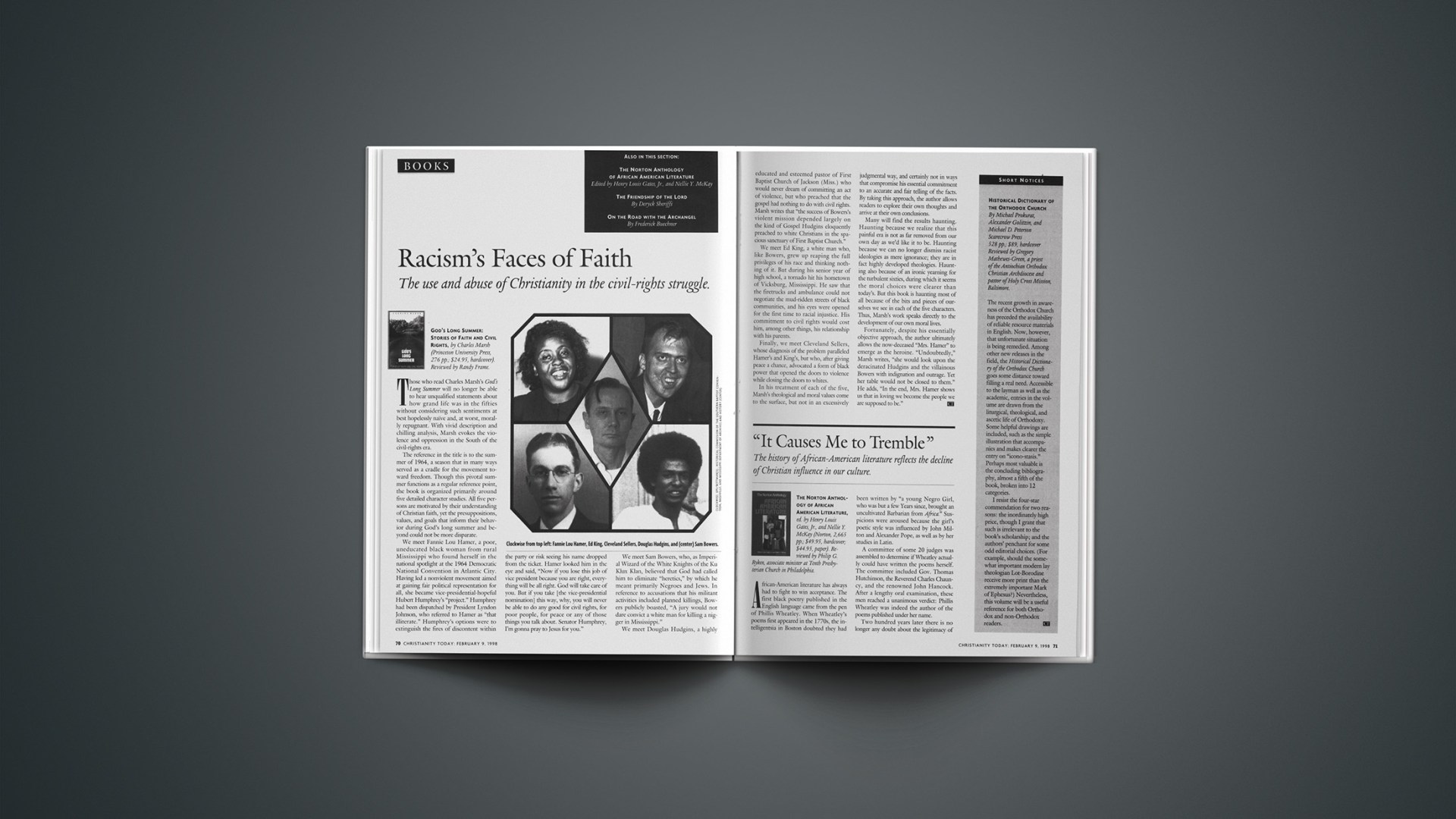GOD’S LONG SUMMER: STORIES OF FAITH AND CIVIL RIGHTS, by Charles Marsh (Princeton University Press, 276 pp.; $24.95, hardcover). Reviewed by Randy Frame.
Those who read Charles Marsh’s God’s Long Summer will no longer be able to hear unqualified statements about how grand life was in the fifties without considering such sentiments at best hopelessly nave and, at worst, morally repugnant. With vivid description and chilling analysis, Marsh evokes the violence and oppression in the South of the civil-rights era.
The reference in the title is to the summer of 1964, a season that in many ways served as a cradle for the movement toward freedom. Though this pivotal summer functions as a regular reference point, the book is organized primarily around five detailed character studies. All five persons are motivated by their understanding of Christian faith, yet the presuppositions, values, and goals that inform their behavior during God’s long summer and beyond could not be more disparate.
We meet Fannie Lou Hamer, a poor, uneducated black woman from rural Mississippi who found herself in the national spotlight at the 1964 Democratic National Convention in Atlantic City. Having led a nonviolent movement aimed at gaining fair political representation for all, she became vice-presidential-hopeful Hubert Humphrey’s “project.” Humphrey had been dispatched by President Lyndon Johnson, who referred to Hamer as “that illiterate.” Humphrey’s options were to extinguish the fires of discontent within the party or risk seeing his name dropped from the ticket. Hamer looked him in the eye and said, “Now if you lose this job of vice president because you are right, everything will be all right. God will take care of you. But if you take [the vice-presidential nomination] this way, why, you will never be able to do any good for civil rights, for poor people, for peace or any of those things you talk about. Senator Humphrey, I’m gonna pray to Jesus for you.”
We meet Sam Bowers, who, as Imperial Wizard of the White Knights of the Ku Klux Klan, believed that God had called him to eliminate “heretics,” by which he meant primarily Negroes and Jews. In reference to accusations that his militant activities included planned killings, Bowers publicly boasted, “A jury would not dare convict a white man for killing a nigger in Mississippi.”
We meet Douglas Hudgins, a highly educated and esteemed pastor of First Baptist Church of Jackson (Miss.) who would never dream of committing an act of violence, but who preached that the gospel had nothing to do with civil rights. Marsh writes that “the success of Bowers’s violent mission depended largely on the kind of Gospel Hudgins eloquently preached to white Christians in the spacious sanctuary of First Baptist Church.”
We meet Ed King, a white man who, like Bowers, grew up reaping the full privileges of his race and thinking nothing of it. But during his senior year of high school, a tornado hit his hometown of Vicksburg, Mississippi. He saw that the firetrucks and ambulance could not negotiate the mud-ridden streets of black communities, and his eyes were opened for the first time to racial injustice. His commitment to civil rights would cost him, among other things, his relationship with his parents.
Finally, we meet Cleveland Sellers, whose diagnosis of the problem paralleled Hamer’s and King’s, but who, after giving peace a chance, advocated a form of black power that opened the doors to violence while closing the doors to whites.
In his treatment of each of the five, Marsh’s theological and moral values come to the surface, but not in an excessively judgmental way, and certainly not in ways that compromise his essential commitment to an accurate and fair telling of the facts. By taking this approach, the author allows readers to explore their own thoughts and arrive at their own conclusions.
Many will find the results haunting. Haunting because we realize that this painful era is not as far removed from our own day as we’d like it to be. Haunting because we can no longer dismiss racist ideologies as mere ignorance; they are in fact highly developed theologies. Haunting also because of an ironic yearning for the turbulent sixties, during which it seems the moral choices were clearer than today’s. But this book is haunting most of all because of the bits and pieces of ourselves we see in each of the five characters. Thus, Marsh’s work speaks directly to the development of our own moral lives.
Fortunately, despite his essentially objective approach, the author ultimately allows the now-deceased “Mrs. Hamer” to emerge as the heroine. “Undoubtedly,” Marsh writes, “she would look upon the deracinated Hudgins and the villainous Bowers with indignation and outrage. Yet her table would not be closed to them.” He adds, “In the end, Mrs. Hamer shows us that in loving we become the people we are supposed to be.”
Short NoticesHISTORICAL DICTIONARY OF THE ORTHODOX CHURCHBy Michael Prokurat, Alexander Golitzin, and Michael D. Peterson Scarecrow Press 528 pp.; $89, hardcover Reviewed by Gregory Mathewes-Green, a priest of the Antiochian Orthodox Christian Archdiocese and pastor of Holy Cross Mission, Baltimore.
The recent growth in awareness of the Orthodox Church has preceded the availability of reliable resource materials in English. Now, however, that unfortunate situation is being remedied. Among other new releases in the field, the Historical Dictionary of the Orthodox Church goes some distance toward filling a real need. Accessible to the layman as well as the academic, entries in the volume are drawn from the liturgical, theological, and ascetic life of Orthodoxy. Some helpful drawings are included, such as the simple illustration that accompanies and makes clearer the entry on “icono-stasis.” Perhaps most valuable is the concluding bibliography, almost a fifth of the book, broken into 12 categories.
I resist the four-star commendation for two reasons: the inordinately high price, though I grant that such is irrelevant to the book’s scholarship; and the authors’ penchant for some odd editorial choices. (For example, should the somewhat important modern lay theologian Lot-Borodine receive more print than the extremely important Mark of Ephesus?) Nevertheless, this volume will be a useful reference for both Orthodox and non-Orthodox readers.
Copyright © 1998 Christianity Today. Click for reprint information.










